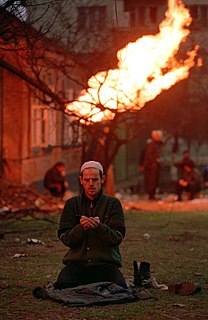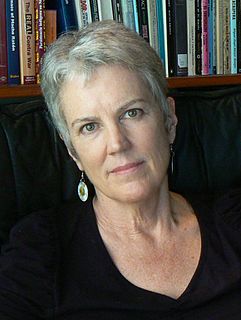Related Research Articles
Oligarchy is a form of power structure in which power rests with a small number of people. These people may or may not be distinguished by one or several characteristics, such as nobility, fame, wealth, education, or corporate, religious, political, or military control.
Political science is the scientific study of politics. It is a social science dealing with systems of governance and power, and the analysis of political activities, political thought, political behavior, and associated constitutions and laws.

An ethnic conflict is a conflict between two or more contending ethnic groups. While the source of the conflict may be political, social, economic or religious, the individuals in conflict must expressly fight for their ethnic group's position within society. This criterion differentiates ethnic conflict from other forms of struggle.
Mass killing is a concept which has been proposed by genocide scholars who wish to define incidents of non-combat killing which are perpetrated by a government or a state. A mass killing is commonly defined as the killing of group members without the intention to eliminate the whole group, or otherwise the killing of large numbers of people without a clear group membership.
Accountability, in terms of ethics and governance, is equated with answerability, blameworthiness, liability, and the expectation of account-giving. As in an aspect of governance, it has been central to discussions related to problems in the public sector, nonprofit and private (corporate) and individual contexts. In leadership roles, accountability is the acknowledgment and assumption of responsibility for actions, products, decisions, and policies including the administration, governance, and implementation within the scope of the role or employment position and encompassing the obligation to report, explain and be answerable for resulting consequences.
In economics, the Dutch disease is the apparent causal relationship between the increase in the economic development of a specific sector and a decline in other sectors.

Democratization, or democratisation, is the transition to a more democratic political regime, including substantive political changes moving in a democratic direction. It may be the transition from an authoritarian regime to a full democracy, a transition from an authoritarian political system to a semi-democracy or transition from a semi-authoritarian political system to a democratic political system.
International political economy (IPE) or Global political economy (GPE) is the study interactions between the economy on a global level and political and economic actors, systems and institutions. More precisely, IPE/GPE focuses on global economic governance, through studies of macroeconomic phenomena such as globalization, international trade, the monetary and financial system, international inequality, and development, and how these are shaped by, amongst others, international organizations, multinational corporations, and sovereign states.

Comparative politics is a field in political science characterized either by the use of the comparative method or other empirical methods to explore politics both within and between countries. Substantively, this can include questions relating to political institutions, political behavior, conflict, and the causes and consequences of economic development. When applied to specific fields of study, comparative politics may be referred to by other names, such as comparative government.
In current political-science and international-relations theory, a rentier state is a state which derives all or a substantial portion of its national revenues from the rent paid by foreign individuals, concerns or governments.

Barrington Moore Jr. was an American political sociologist, and the son of forester Barrington Moore.
The resource curse, also known as the paradox of plenty or the poverty paradox, is the phenomenon of countries with an abundance of natural resources having less economic growth, less democracy, or worse development outcomes than countries with fewer natural resources. There are many theories and much academic debate about the reasons for, and exceptions to, these adverse outcomes. Most experts believe the resource curse is not universal or inevitable, but affects certain types of countries or regions under certain conditions.

Stephen David Krasner is an American academic and former diplomat. Krasner has been a professor of international relations at Stanford University since 1981, and served as the Director of Policy Planning from 2005 to April 2007 while on leave from Stanford.
Michael Herb is an American political scientist who gained prominence through his All in the Family thesis of Arab monarchies.
Authoritarianism is a form of government characterized by the rejection of political plurality, the use of strong central power to preserve the political status quo, and reductions in the rule of law, separation of powers, and democratic voting. Political scientists have created many typologies describing variations of authoritarian forms of government. Authoritarian regimes may be either autocratic or oligarchic and may be based upon the rule of a party or the military.

A coup d'état, is a seizure and removal of a government and its powers. Typically, it is an illegal seizure of power by a political faction, rebel group, military, or a dictator. Many scholars consider a coup successful when the usurpers seize and hold power for at least seven days.

Virginia Tilley is an American political scientist specialising in the comparative study of ethnic and racial conflict. She is Professor of Political Science at Southern Illinois University-Carbondale in the US.
Benjamin Andrew Valentino is a political scientist and professor at Dartmouth College. His 2004 book Final Solutions: Mass Killing and Genocide in the 20th Century, adapted from his PhD thesis and published by Cornell University Press, has been reviewed in several academic journals.
Andreas Wimmer is a Swiss sociologist who is the Lieber Professor of Sociology and Political Philosophy at Columbia University. He has a PhD in social anthropology from the University of Zurich.
Rational choice is a prominent framework in international relations scholarship. Rational choice is not a substantive theory of international politics, but rather a methodological approach that focuses on certain types of social explanation for phenomena. In that sense, it is similar to constructivism, and differs from liberalism and realism, which are substantive theories of world politics. Rationalist analyses have been used to substantiate realist theories, as well as liberal theories of international relations.
References
- ↑ benjaminbsmith.net
- ↑ "Benjamin Smith".
- ↑ Hard Times in the Lands of Plenty: Oil Politics in Iran and Indonesia. Cornell University Press. 2007-08-02. ISBN 9780801472770.
- ↑ Smith, Benjamin (2004). "Oil Wealth and Regime Survival in the Developing World, 1960-1999". American Journal of Political Science. 48 (2): 232–46. doi:10.1111/j.0092-5853.2004.00067.x.
- ↑ Smith, Benjamin (2006). "The Wrong Kind of Crisis". Studies in Comparative International Development. 40 (4): 55–76. doi:10.1007/BF02686303. S2CID 55381253.
- ↑ "Resource Wealth as Rent Leverage: Rethinking the Oil-Stability Nexus". Conflict Management and Peace Science.
- ↑ Smith, Benjamin (2013). "Separatist Conflict in the Former Soviet Union and Beyond: How Different Was Communism?". World Politics. 65 (2): 350–81. doi:10.1017/s0043887113000087. S2CID 144720333.
- ↑ Smith, Benjamin (2005). "Life of the Party: The Origins of Regime Persistence and Breakdown Under Single-Party Rule". World Politics. 57 (3): 421–51. doi:10.1353/wp.2006.0004. S2CID 15529113.
- ↑ Slater, Dan; Smith, Benjamin; Nair, Gautam (2014). "Economic Origins of Democratic Breakdown? The Redistributive Model and the Postcolonial State". Perspectives on Politics. 12 (2): 353–74. doi:10.1017/s1537592714000875. S2CID 73626964.